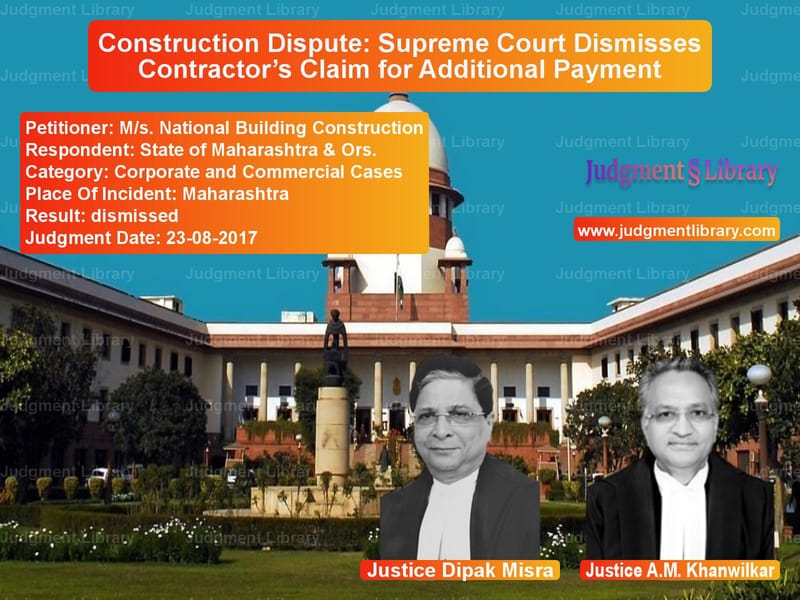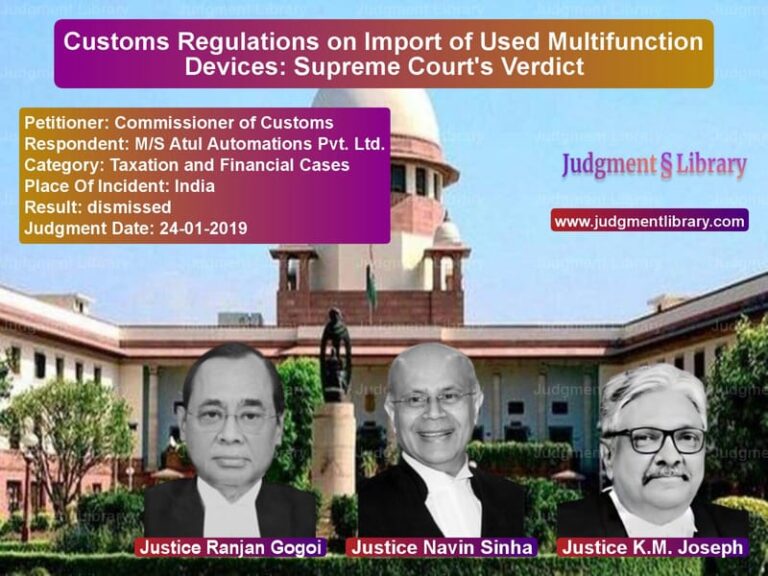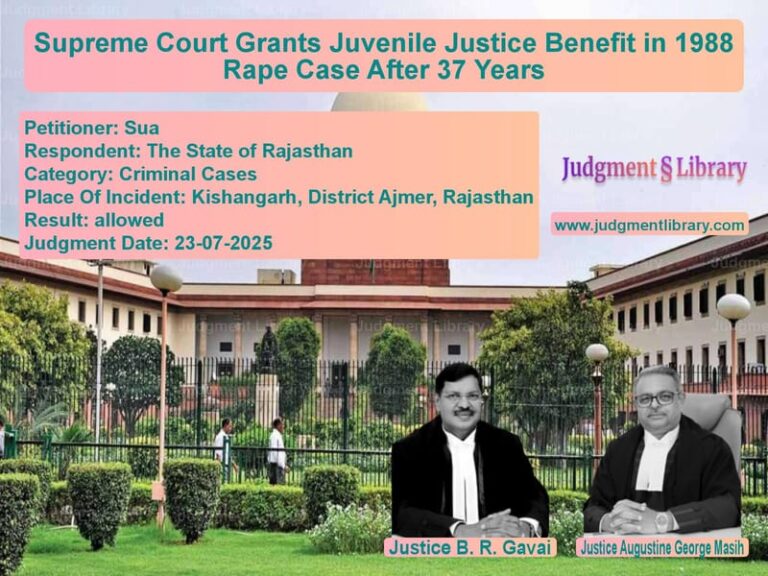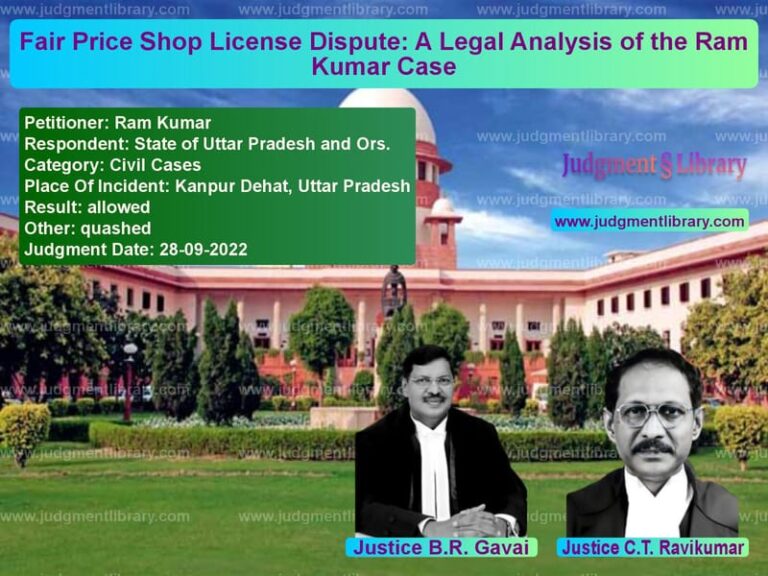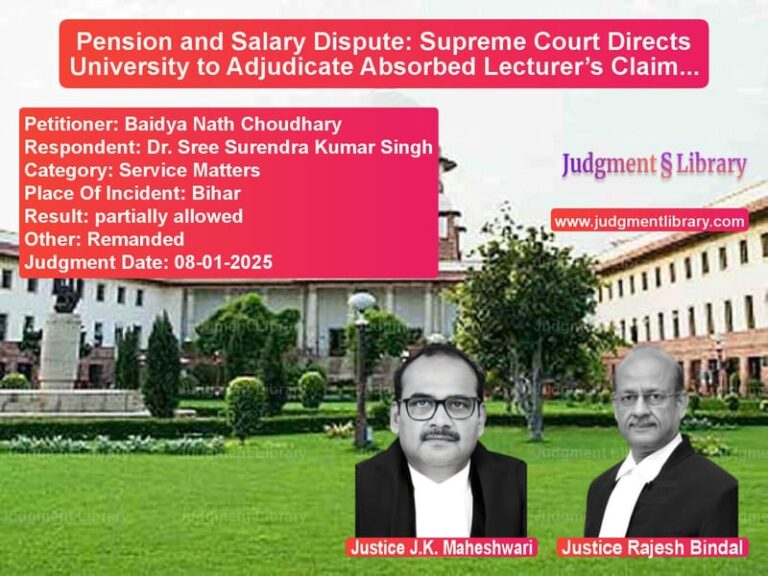Construction Dispute: Supreme Court Dismisses Contractor’s Claim for Additional Payment
The case of M/s. National Building Construction vs. State of Maharashtra & Ors. pertains to a contractual dispute regarding additional payments for construction work executed under a government contract. The Supreme Court was required to determine whether the contractor was entitled to additional payments claimed beyond the agreed contract rates.
Background of the Case
The appellant, M/s. National Building Construction, was awarded a contract by the State of Maharashtra for the construction of Nishanghat Minor Irrigation Tank. The contract was executed on December 21, 1978, and the work was completed on June 16, 1982. However, a dispute arose regarding unpaid claims, which the appellant alleged were not included in the final bill settled on October 22, 1982.
The appellant filed a suit before the Civil Judge, Nagpur, claiming compensation for unpaid amounts related to additional work. The claims were as follows:
- Claim 1: Unpaid amounts for excess stone revetment/pitching – Rs. 1,76,199.28
- Claim 2: Unpaid amounts for excavation work – Rs. 90,165
- Claim 3: Additional lead for water – Rs. 80,000
- Claim 4: Extra lead for sand – Rs. 9,900
Additionally, the appellant sought interest of Rs. 1,42,505.60 at 15% per annum from the date of final payment, bringing the total claim to Rs. 4,98,769.86.
Legal Issues
The Supreme Court examined the following issues:
- Whether the claims for additional payments were valid under the contract.
- Whether the government’s rectification of prescribed contract rates was legally justified.
- Whether the High Court erred in rejecting claims 1 and 3.
Arguments by the Petitioner (M/s. National Building Construction)
The petitioner, through its counsel, contended:
- The rectification of government-prescribed rates for pitching work was done after the contract execution and was unfair.
- Additional lead for water was necessary and should be compensated beyond contract terms.
- The High Court erred in modifying the amount awarded by the trial court.
Arguments by the Respondent (State of Maharashtra & Ors.)
The respondents countered:
- The claims regarding pitching rates were inflated and had already been addressed under contract terms.
- The contract explicitly stated that additional lead for water was not payable separately.
- The final payments were made as per agreed contract rates, and no additional amounts were due.
Supreme Court Judgment
The Supreme Court upheld the High Court’s decision, dismissing claims 1 and 3 while allowing claims 2 and 4. The key observations made by the Court were:
- The rectification of prescribed contract rates was necessary to correct an anomaly and did not constitute an unfair retrospective amendment.
- The appellant had already been paid at a rate higher than the corrected rate.
- The contract explicitly excluded extra lead for water from additional compensation.
- The trial court’s decision was partially incorrect as it had overlooked key contractual provisions.
Observations of the Supreme Court
The Court stated:
“The findings of the High Court, in our opinion, are justified as they are based on contract terms and government regulations. The rectification of CSR rates was not an unfair retrospective amendment but a necessary correction.”
The Court further ruled:
“We find no merit in the appellant’s claim for additional payment regarding extra lead for water, as the agreement explicitly barred such compensation. However, the claims allowed by the High Court should stand.”
Conclusion
The Supreme Court’s ruling reinforces the principle that contractual obligations and officially prescribed rates must be followed in government construction disputes. The judgment underscores:
- The necessity of adhering to contract terms when determining payment entitlements.
- The role of courts in ensuring fair payment practices while preventing overcompensation.
- The importance of rectifying official government schedules to prevent financial anomalies.
This ruling serves as an important precedent in disputes involving government contracts, ensuring that contract modifications and rectifications are not unfairly challenged.
Don’t miss out on the full details! Download the complete judgment in PDF format below and gain valuable insights instantly!
Download Judgment: Ms. National Buildi vs State of Maharashtra Supreme Court of India Judgment Dated 23-08-2017.pdf
Direct Downlaod Judgment: Direct downlaod this Judgment
See all petitions in Contract Disputes
See all petitions in Bankruptcy and Insolvency
See all petitions in Specific Performance
See all petitions in Judgment by Dipak Misra
See all petitions in Judgment by A M Khanwilkar
See all petitions in dismissed
See all petitions in supreme court of India judgments August 2017
See all petitions in 2017 judgments
See all posts in Corporate and Commercial Cases Category
See all allowed petitions in Corporate and Commercial Cases Category
See all Dismissed petitions in Corporate and Commercial Cases Category
See all partially allowed petitions in Corporate and Commercial Cases Category

